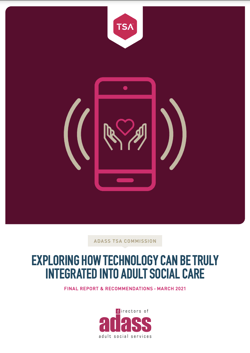Role of tech in adult social care highlighted in new report
A new report has highlighted the gaps in technology-adoption by local authorities when it comes to putting their adult care services on a sustainable footing.
 Produced by The Association of Directors of Adult Social Services (ADASS) and the TEC Services Association (TSA), the report authors received evidence from nearly 60 service users, directors of adult social care, housing and health leaders and technology vendors.
Produced by The Association of Directors of Adult Social Services (ADASS) and the TEC Services Association (TSA), the report authors received evidence from nearly 60 service users, directors of adult social care, housing and health leaders and technology vendors.
The report urged directors of adult social care to make their services less reactive by collaborating with service providers and manufacturers so health and care data from apps and devices can be used by the social care workforce to identify people with needs.
It also found that digital projects are rarely joined up and turned into intelligence to prevent people reaching a crisis, and calls for normalising the use of digital within social care, urging the Government to include digital literacy and data sharing training in its future social care workforce strategy.
Join us for a live panel discussion (3.30-4.15pm, 20th May) featuring Adult Care Directors from Local Government.
(Free for public sector.)
 "We have developed recommendations for councils, care and technology providers and the Government so we can all make progress," said Iain MacBeath, Strategic Director of Health and Wellbeing at Bradford Council, and one of the report authors. "One of the main barriers to integration boils down to how councils write tender specifications. We generally buy what we’ve always bought. Why would care and technology providers invest in new products when councils won’t commission them?"
"We have developed recommendations for councils, care and technology providers and the Government so we can all make progress," said Iain MacBeath, Strategic Director of Health and Wellbeing at Bradford Council, and one of the report authors. "One of the main barriers to integration boils down to how councils write tender specifications. We generally buy what we’ve always bought. Why would care and technology providers invest in new products when councils won’t commission them?"
Describing it as a "moral obligation" to harness technology to improve adult care, MacBeath, who is also the Honorary Treasurer of ADASS, made four recommendations for what Directors of Adult Care needed to focus on:
- To overcome hurdles around knowledge, imagination and confidentiality, we must form alliances now, between people, the workforce, care providers, tech companies and commissioners to design integrated services.
- We must bring new skills into councils – business analysts will become as important as care managers.
- When the next contract round comes up, we need different specifications and tenders for a new, responsive service that has been co-produced by people, their families, carers and the workforce.
- We need investment. Databases and algorithms don’t have to be designed 150 times. Much of the software required is already owned by councils and providers, but we need the capacity and expertise to release that potential. And the infrastructure that underpins current offers is sometimes hard-wired into housing or reliant on phone lines – this needs future-proofing.
Join us for a live panel discussion (3.30-4.15pm, 20th May) featuring Adult Care Directors from Local Government.
(Free for public sector.)







